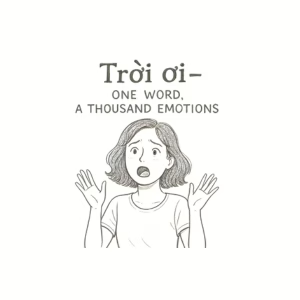If you’ve ever walked the streets of Vietnam, sat at a family dinner, or watched a Vietnamese drama, chances are you’ve heard someone say “Trời ơi!”
It’s just two syllables.
But behind those sounds lies a universe of emotions.
What does “Trời ơi” mean?
Literally, “trời” means “sky” or “heaven,” and “ơi” is a calling particle. Put together, “Trời ơi” can be translated loosely as “Oh my God”, “Oh heavens”, or simply… a dramatic sigh thrown into the air.
But if you think it stops there—you’re missing the magic.
The Emotional Spectrum of “Trời ơi”
Depending on how it’s said, “Trời ơi” can express:
- 😱 Shock: Trời ơi, thật không? – Oh my God, really?
- 😭 Desperation: Trời ơi… sao lại như thế này? – Oh God… how did it end up like this?
- 😂 Laughter: Trời ơi, cười muốn xỉu! – Oh my, I’m laughing to death!
- 😤 Frustration: Trời ơi, nói bao nhiêu lần rồi! – Goodness, how many times do I have to say it!
- 🥺 Compassion: Trời ơi, tội nghiệp quá… – Oh dear, poor thing…
- 😍 Admiration: Trời ơi, đẹp quá chừng! – Wow, that’s stunning!
There’s no single way to pin it down. That’s the beauty of Vietnamese.
Why is “Trời ơi” so powerful?
Because Vietnamese is a tonal and highly expressive language, intonation is everything.
The same phrase said in a soft whisper, a dramatic scream, or a sarcastic tone can mean completely different things. Native speakers don’t need subtitles—they feel the emotion through sound alone.
“Trời ơi” is not just a phrase—it’s an emotional release, a reflex, a cultural rhythm.
It connects us, comforts us, and sometimes, replaces a whole sentence.
Learning “Trời ơi” as a Non-Native Speaker
If you’re learning Vietnamese, don’t be afraid to experiment with it.
Try it next time your Vietnamese friend tells you something surprising.
Say it when your bánh mì falls on the floor.
Whisper it when you see a beautiful sunset over Hội An.
The more you use it, the more you’ll understand its depth.
In the End…
“Trời ơi” is the soul of everyday Vietnamese speech.
It’s casual, emotional, and deeply human.
A cry, a laugh, a sigh, a song.
So next time you hear it—or feel the urge to say it—don’t hold back.
Let your inner Vietnamese spirit shine.
Trời ơi… isn’t language beautiful?

Comments